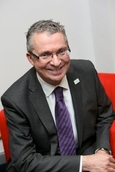More than 450,000 people have dementia but have not been officially diagnosed

More than 450,000 people have dementia but have not been officially diagnosed, according to the Alzheimer’s Society.
Figures show the number of people being diagnosed with dementia in England and Wales rose in a year by 18,000 from 265,000 to 283,000.
However, only 41 per cent of people living with dementia have a diagnosis - an increase of 2 per cent since last year.
It is thought that there are now more than 400,000 people that are living with the condition but aren't receiving any of the benefits, support and drug treatments that can come from receiving a diagnosis.
The World Alzheimer's Report 2010 showed that an early diagnosis can save the taxpayer thousands of pounds, because it can delay someone needing care outside of their own home.
Jeremy Hughes, chief executive of Alzheimer's Society said: ‘A diagnosis opens the door to support, benefits and the possibility of medical treatment which can make a real difference to people's lives.’
‘If you find that memory loss is starting to interfere with daily life then it's important to get it checked out as soon as possible. The sooner people are diagnosed, the sooner they can get the support they need.’
Elizabeth Ashton, whose mother, Pamela, was diagnosed with Vascular Dementia in 2008, because she had been suffering from the disease for at least 10 year before her death last year.
She said: ‘I can see now that we should have been more aware, and an early diagnosis would have been a great help. She might have responded to medication had she been diagnosed earlier, and we would have had a greater understanding of the difficulties she faced.'
'I thought her forgetfulness was just a sign of aging and pursuing a diagnosis at the time just didn't occur to me or my GP.'
Alzheimer's Society has joined forces with Tesco and is currently touring the UK to raise awareness of dementia.
The society is urging anyone concerned about memory problems, and experiencing any of the following should speak to their GP:
• struggling to remember recent events • finding it difficult to follow conversations or programmes on TV • regularly forgetting the names of friends or everyday objects • unable to recall things you've heard, seen or read • having difficulty in making decisions • repeating conversations or losing the thread in speech • having problems thinking and reasoning • feeling anxious, depressed or angry about your forgetfulness • finding that other people are commenting on your forgetfulness
Jeremy Hughes, chief executive of the Alzheimer's Society is pictured above
Latest News
 29-Jul-24
Dementia Bus gives carehome.co.uk staff insight into life with dementia
29-Jul-24
Dementia Bus gives carehome.co.uk staff insight into life with dementia
 27-Jul-23
UK's top home care agencies in 2023 revealed
27-Jul-23
UK's top home care agencies in 2023 revealed
 30-Nov-22
A quarter of older people keep their falls secret from family
30-Nov-22
A quarter of older people keep their falls secret from family
 29-Nov-22
'Covid-19 has not gone away' say terminally ill
29-Nov-22
'Covid-19 has not gone away' say terminally ill
 28-Nov-22
IT consultant who received poor care opens 'compassionate' home care business
28-Nov-22
IT consultant who received poor care opens 'compassionate' home care business